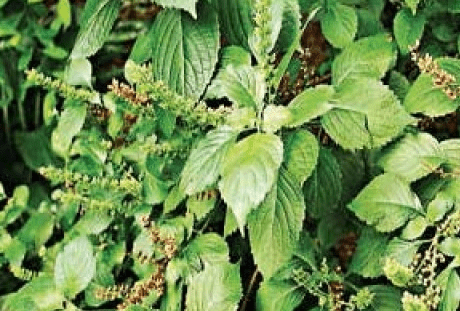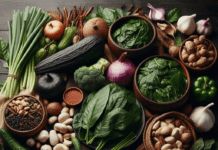Ocimum gratissimum, basil, or “scent leaf”, as Nigerians love to call it, is a tropical plant species. Popularly known as efirin by the Yorubas, nchanwu by the Ibos and daidoya by northerners, the leaf, which is highly nutritional, is quite common in Nigeria. The leaf contains various nutrients and minerals which confer numerous health benefits on the plant. Fresh basil leaves are reported to contain protein, magnesium and cinnamic acid. They are also rich in anetol, boron compounds, eugenol compound, stigmasterol, tannin, zinc and tryptophan.

Uses and preparations
Fresh basil leaves are used as a local spice and flavour in preparing soups. This soup can serve as an appetite stimulant. Including generous amounts of basil in diets can result in marked reduction in blood glucose level. This may be because the leaf contains cinnamanic acid, which has been found to enhance circulation, stabilise blood sugar, and improve breathing in those with respiratory disorders.
Scent leaf, brewed as tea, has been used as a remedy for stomach disorders, including gastroenteritis. Chewing on the leaves can relieve colds and flu symptoms. Boiling the leaves with honey or ginger is useful for treating asthma, bronchitis, cough, cold, and influenza.
Water extract or juice of basil has antispasmodic effect and is utilised in the treatment and management of convulsion and seizures. Water boiled with basil can be taken as a tonic or used as a gargle for sore throat.
Drinking the squeezed juice from scent leaves will stop stooling. To get the best, one can add salt or lime which gives a better taste and also ease the unnecessary bowel movement being experienced.
Scent leaf oil can be used as a food preservative due to its anti-microbial and anti-bacterial properties. These anti-microbial properties make it useful for the treatment of oral infections, mouth odour, tooth decay, fungal infections and bad breath. Squeezed scent leaves are applied on the skin for treating skin diseases and ringworm.
Studies also show that scent leaf has antibacterial activity against Saphylococcus aureus, Salmonella enteritidis, Escherichia coli. It has antifungal activity against Penicillium notatum, Candida albicans, Microsporeum gyseum. It also has larvicidal activity against houseflies, mosquitoes and other insects.
When left to dry and burnt, scent leaves could serve as a mosquito repellent. The seeds of the plant can be infused for treating urinary infections and gonorrhoea infection, as well as being used for vaginal douches to treat vaginitis.
Recent findings have shown that scent leaf can be useful in the medication for people living with Human Immunodefficiency Virus (HIV) and Acquired Immune Deficiency Syndrome (AIDS). However, pregnant women are prohibited from using it because it is feared that it could cause a miscarriage.
Economic uses
Exportation of Nigerian horticultural products is reported to have increased with the evidence that in 2012 $1.6 billion worth of vegetables was exported and between January and July 2013, 1.86 metric tons of vegetables were exported. Participants in this market make up to $200,000 monthly.
Scent leaf vegetable is important to both local and international markets. States can key into the business of farming scent leaf, not only to meet local demand but for export to earn dollars. A large farm of this vegetable can earn lots of money. Cottage industries can exploit it to extract essential oils. They can package the dried leaves alone as a spice or combine it with other local spices. Fresh extract of the leaves are sold on daily basis to herbal hospitals for use of patients.
Scent leaf can be incorporated into mosquito coils, incense, creams or ointments, to drive away insects and reptiles. The fresh vegetable can be sold in open markets or delivered directly to hotels, restaurants or prepared for exports.
There are immense opportunities for export of scent leaf and other vegetables to European countries.














Great post thanks
I think this is a fantastic topic and really like how your blog looks. Appreciate you sharing.
Hello
Very informative and educative,pls always update me on other herbs. I’m a gardner and have shade dried leaves of moringa,scent,bitter leaf and guava for sale in Ibadan. Thanks
Since you refer yourself as a Researcher, make a research to know if there’s any tribe call “IBO” in Nigeria, they are called IGBO not IBO . Always make proper findings on your research however your article is very Educating.
How can market the scent leaves
Spot lets start work on this write-up, I really think this fabulous website wants a great deal more consideration. I’ll oftimes be once more to learn to read much more, many thanks that information.
Please keep informing me about keys information that will be a help to me.
Thanks.
Let me thank this website for this information. I am a science student who has highly interest in research in the area of medicine (herds) and study pharmacology. So, with this website it will help me to improve my knowledge on herds medicine.so please help me with constant daily information. Thanks
hello Morgan,
how is your research going?
i wish you all the best in your study.
bit.ly/3bw4R8H